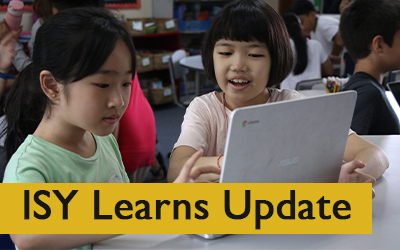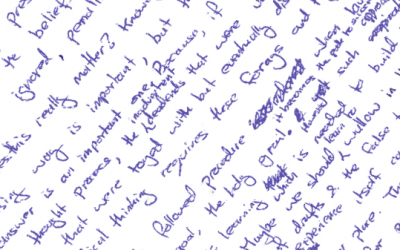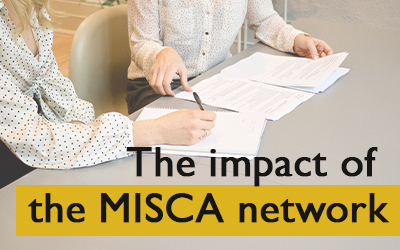ISY LEARNS
Building Positive Relationships with Students

Eric Brown, Director of Curriculum & Learning
March 12, 2021
“They may forget what you said, but they will not forget how you made them feel.” – Carl J. Buechner

Despite not writing for some time, I would like to continue my thoughts on my version of a three legged stool for learning. This week, I’d like to focus on the power of relationships and what that means to student learning and engagement.
The superintendent at my previous school used to stand at the gate every morning and say “Good Morning!” to every single one of the 2000+ students who came onto campus. He was brand new to the school and unknown to all students who shyly looked his way or just ignored him for the first several weeks. Over time, however, nearly every single student from the nursery to high school began not only saying, “Good morning Dr. Mack!” but also going over to give him a fist bump or a high five. Because of the size of our school, Dr. Mack really did not interact with students as much as he would like, but there is no doubt in my mind that he changed students’ attitudes about coming to school by simply greeting them with a warm and friendly greeting every single morning.
In a typical year, elementary students spend nearly 1000 hours with their teacher. The impact of this is obvious, and I’m sure all of us can remember those teachers who made the most impact on us. For some, we couldn’t wait to go to their class; while others, we counted the ticks on the clock until the period was over. Brain research supports the impact of positive relationships of teachers and students, and I enjoyed this brief article from understood.org concerning the brain science behind building positive relationships with students and how to do it. Conversely, if you are looking at the effects of having a negative relationship, look no further than John Hattie’s research on negative effect size of “boredom = -.49” and “students feeling disliked = -.19.” Ouch!
Mrs. Schenck, my middle school English teacher, once left a note on one of my papers that read, “Eric, I hope that you one day become a doctor, astronaut, or president.” Oddly enough, I’m pretty sure middle school Eric only wanted to be a Major League Baseball player; but it was that small note that gave me the confidence to know I could do anything, and I would always have someone in my corner rooting for me. My favorite teacher of all time was my middle school social studies teacher Mr. Blevins. His storytelling of events were legendary and brought history alive for us, and it is he who inspired me to become a social studies teacher many years later. We are still “Facebook” friends who comment on each others’ posts.
I believe I worked hard as a teacher to develop relationships with students. When I first started teaching middle school at the age of 23, it certainly seemed easier as I was able to keep up with what “kids these days” were doing (popular culture, video games, etc). Coaching a sport helped too; and if you could hit a layup, do a wicked crossover dribble, or nail a 3 from downtown, you were placed on the highest pedestal with many students. This movie clip with Jason Sedaris brings back memories of similar conversations (and arguments) I’ve had with my students. I also worked hard to read what they were reading to engage them in the books they read, whether it was Harry Potter, Percy Jackson, or Hunger Games. In short, it was much easier for me to discuss Georgia History or have difficult conversations about an assessment if I had made a connection with them on some personal level.
However, as I got older, I had to work even harder to “keep up” with what students. When I first moved overseas, I quickly realized I would have to learn the game of soccer, the best players of the game, and greatest teams of all time. Likewise today, if you are not talking with your students about Minecraft, Among Us, and their favorite Youtubers then you are missing huge opportunities to make connections with them. Making references to these and embedding them into your lessons can go a long way to build those relationships.
While these examples will certainly make positive connections with students, they are merely surface level in nature. The truest way we can build positive relationships is when we can genuinely show our concern and care for students. We celebrate their successes in and out of the classroom and empathize with them in their failures. Whose student doesn’t love it when they see our smiling and proud faces in the stands of an athletic event? And, when they miss the final shot that would’ve won their team the game, whose student wouldn’t want a comforting message of encouragement?
We model for them what compassion and kindness look like in everyday life. When I was in 7th grade, one of my best friends had their family home burn down in which they lost everything. Without missing a beat, it was our middle school teachers who took up donations for my friend’s family and made sure they were taken care of in the midst of a cold winter. 30 years later, I read a message on social media to those teachers from my friend thanking them for their kindness and the impact it made on him.
Supporting student learning should be about helping to foster their sense of curiosity and providing meaningful feedback. That is the core of what we do as teachers; however, it is through positive and meaningful relationships with students that provides the support they need in their social and emotional growth that enables the learning to flourish. So, thank you Mrs. Schenck and Mr. Blevins for believing in me, supporting me, and modeling for me how to be a learner and compassionate person.
Previous ISY Learns Posts
ISY Learns Updates – April 1, 2021
This edition of ISY Learns Update is jammed packed with helpful and thought provoking articles.
ISY Learns Updates – March 19, 2021
This edition of ISY Learns Update provides interesting/helpful updates for ISY teachers.
ISY Learns Updates – February 16, 2021
This edition of ISY Learns Update provides interesting/helpful updates for ISY teachers.
Just One More Mistake
ISY Secondary Teacher Graeme Foster provides insight on how making mistakes and being comfortable with them is an important trait to nurture.
ISY Learns Updates – February Edition
This February Edition of ISY Learns Update provides a brief update of Quarter 3 planning as well as interesting/helpful updates for ISY teachers.
The Impact of the MISCA Network
ISY’s High School Counselor Mick Amundson-Geisel provides insight on how the MISCA Network has impacted not only his practice but the lives our our ISY students.



